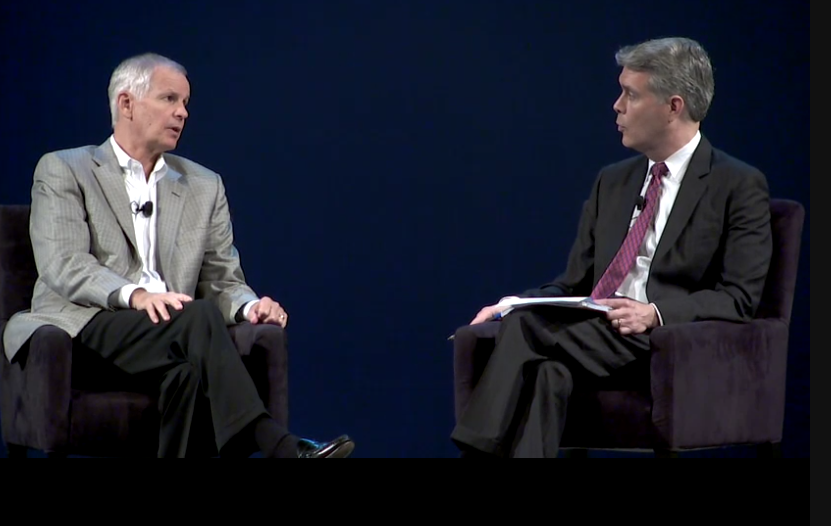Ergen: Narrowband Net Will Be 'Big Dish' IoT Play; 5G to Follow
The smarter way to stay on top of the multichannel video marketplace. Sign up below.
You are now subscribed
Your newsletter sign-up was successful

Dish Network chairman Charlie Ergen said he is treating his company like a start-up, with an eye toward becoming an internet of things (he calls it internet of everything), 5G network provider.
Ergen said that while incumbents do a great job of connecting 300 million people to their phones, the future is going to be in connecting 300 billion things to sensors and machines and microprocessors.
He was being interviewed by former FCC commissioner Robert McDowell at the Wireless Infrastructure Association’s Connect Expo in Charlotte, N.C. Wednesday (May 23).
RELATED: Dish Will Spend $1B on First Phase of Build-out
Ergen signaled the company's spectrum aggregation was not a hold-and-sell play. He said Dish has already "signed some master lease agreements with tower companies" for building out the network.
He said that, armed with spectrum and the "adventurous" Dish culture, he is treating the business as a "clean sheet of paper" -- not carrying around the legacy of 2G, 3G or 4G switched networks -- on which Dish will create that new 5G, IoT network.

Ergen said Dish's build-out plan is all about timing: "Too early, you're road kill. Get it just right and you have a chance." He thinks Dish has a chance, but it won't be easy.
The smarter way to stay on top of the multichannel video marketplace. Sign up below.
He said that with 5G the next "paradigm shift, and Dish's spectrum position" -- a limited amount of uplink spectrum -- the company is in a "little bit of an awkward position" and will have to build the businesses in phases. But he likened that to the way Dish was built, first selling big dishes to ranchers and farmers, then eventually putting that C-band dish business out of business with digital and small dishes.
He said Dish's "big dish" phase will be a nationwide, 3G, narrowband IoT network, which will be a technology for massive connectivity; then eventually the company aims to build a full 5G network combining low and mid-band spectrum.
Ergen said he would love to do broadband from the get go, but the company doesn't have enough uplink spectrum cleared to be able to do that. One of the issues with the buildout of the full network is that the 600 MHz spectrum it got in the broadcast incentive auction won't be cleared until 2020, "so we're swimming uphill on that," he said.
Ergen said Dish is playing the hand it has been dealt. He says the initial network will be an open one for anyone who needs sensors for monitoring -- so like selling big dishes to farmers, that initial net could about selling connectivity to farmers with crop sensors.
Dish is under a deadline to build out some of the spectrum it won at auction. Ergen said it was 654 days from now, "not that I'm counting."
Ergen said Dish's disadvantage is the company is not an expert on building out a terrestrial network and it has no mobile customers. But he said its advantage was that "clean sheet of paper," just as it had when Dish remade the "big dish" business into digitally-compressed DBS. "This is a start-up business for us," he said. "The first stage of start-up is to survive. We may be successful but we may not."
Ergen suggested there was not much downside for him. "For me it's not a job," he said. "It's not going to change my standard of living one way or the other. It's a hobby. When it's a hobby you get up every day excited about it."
RELATED: Dish DBS Officially Launches AirTV
Dish also does know how to partner with people "who know more than we do," he said. That includes having signed some master leases with tower companies and spending up to $1 billion on the initial phase of the network. He said that core network will be completed later this summer and testing can begin in the fall.
Ergen's audience included some folks who are helping build out that initial network.
Asked about his take on the new FCC, Ergen said it was doing a good job in general, particularly that it was a "curious FCC."
FCC chairman Ajit Pai, who spoke before Ergen, was on a four-state swing through the south to check out wireless tech. "Anytime you're curious and open-minded, you're ultimately going to make really good decisions and I think for the most part they are." Reducing regulation and helping industry to build cell sites and tower sites was "hugely important," he said, as well as freeing up spectrum.
He said he was being selfish, but that he would like the current litigation over the AWS-3 auction--the conclusion that the small businesses Dish partnered with to secure $10 billion of spectrum did not qualify for bidding credits--would be resolved so Dish could put that spectrum to use.
"Perhaps the biggest and most important takeaway is that Ergen sounds genuinely committed to a build-not-sell plan for his spectrum," said analyst Craig Moffett in a note to investors. "The notion that Dish actually plans to build a network is underscored by Ergen’s disclosure – we believe for the first time – that Dish has begun to enter into real, and long-term, tower lease commitments (these initial contracts have been separately confirmed to us by our sources in the tower industry)."
"As everyone (seemingly) knows, Ergen is a consummate poker player. So perhaps all of this is simply a way to 'force' the issue of a spectrum sale before he enters into even more tower leases and before his FCC buildout deadlines expire," Moffett said. "But Occam’s Razor – the simplest explanation – requires that, when Charlie Ergen says 'yes, we are building a network,' it makes sense to believe him."
Contributing editor John Eggerton has been an editor and/or writer on media regulation, legislation and policy for over four decades, including covering the FCC, FTC, Congress, the major media trade associations, and the federal courts. In addition to Multichannel News and Broadcasting + Cable, his work has appeared in Radio World, TV Technology, TV Fax, This Week in Consumer Electronics, Variety and the Encyclopedia Britannica.

